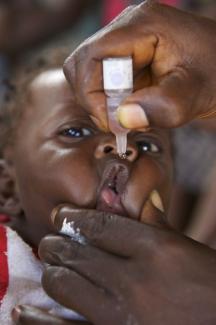Global development
Ignored achievements

One example is public health. International data show that it has improved dramatically. Smallpox has been eradicated, and Polio has almost been eradicated. In 1988, 350,000 new infections were reported around the world. Now we are down to two-digit figures. In 2013, there were 45 % fewer Tuberculosis (TB) patients than in 1990, and the mortality rate had declined by 41 % in that time span. From 1995 to 2014, some 7.6 million deaths of HIV/AIDS were prevented with free supplies of anti-retroviral medication.
Statistics for other sectors are good as well. In India, only 70 % of the people had access to safe drinking water in 1990, but the share rose to 94 % by 2015. In China, the respective figure even went up from 66 % to 95 % – and in Ghana from 55 % to 89 %.
The share of the world population’s extremely poor people has decreased dramatically too. About 90 % of the 1.1 billion people who lived in 1820 were struggling at the subsistence level. In 1970, that was true of 60 % of 3.6 billion people. In 2011, only 14 % of 7 billion people were extremely poor.
Population growth, some might now say, is a challenge in itself – and that is true. However, the speed has been reduced remarkably, and the peak is in sight. The world population may yet grow to 11 billion people at most, but from that point on it will decrease according to current trends.
In spite of such data, many people believe that things just keep getting worse. In rich countries, many citizens doubt that global development efforts make sense at all. Three issues are driving this misperception:
- The media find it much easier to sell bad news, and that results in the impression that things used to be much better than they are today.
- Donor government’s aid efforts are measured by the input. A successful minister for international development manages to mobilise more money, for example, by making his government fulfil the decades-old pledge of spending 0.7 % of gross domestic income on official development assistance (ODA). Taxpayers, however, want to know what is done with those financial resources, and they are not satisfied with mere disbursement figures. It is impossible to indicate the results precisely in euros and cents, and this is directly linked to the third issue.
- Humanity is facing several huge challenges that can only be mastered by taking many small and separate steps. To fight poverty, we must act at local, national and global levels and deal with many different issues – from food supply to employment, from education and health to elderly care. To protect the climate, we must improve energy efficiency and switch to renewables in all sectors – including manufacturing, agriculture, transport and private households. The options are multidimensional, and all action is piecemeal. Causal attribution of results to individual players is next to impossible because of the multitude of partners who must assume responsibility.
The truth is that the share of the world’s extremely poor people has been declining for decades, but many people nonetheless believe that the poor are only getting poorer. And no, the global financial crisis of 2008 did not reverse the long-term trend.
Governmental and non-governmental development agencies alike must do more to make the public aware of developmental success. The point is not to claim that ODA is at the root of all progress. As argued above, linear causality is hard to establish in highly complex context. It would, however, be absurd to argue that ODA is completely useless when some developmental goals have indeed been achieved and others look increasingly within reach.
We must fight hopelessness and resignation. Humankind is indeed facing daunting challenges, and rising to them will require huge collective efforts. In order to tackle this enormous task we need to better understand how much we have already achieved – and how much more we can achieve.
Matthias Meis heads the strategy unit at Germany’s Federal Ministry for Economic Cooperation and Development (BMZ).
matthias.meis@bmz.bund.de













